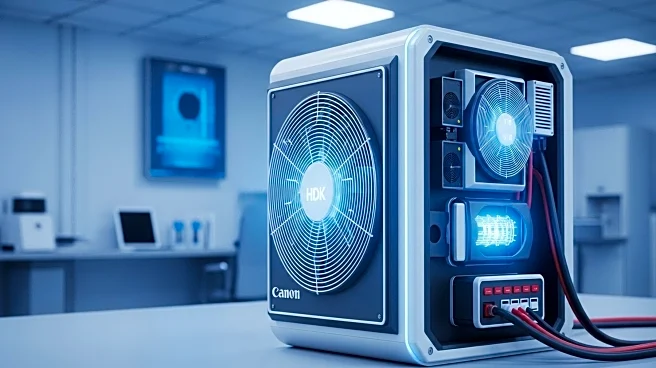What is the story about?
What's Happening?
Researchers at the Johns Hopkins Applied Physics Laboratory have developed a new solid-state thermoelectric refrigeration technology that nearly doubles the efficiency of existing devices. Utilizing nano-engineered materials, this advancement offers a scalable alternative to traditional compressor-based refrigeration systems. The technology, known as controlled hierarchically engineered superlattice structures (CHESS), was initially developed for national security applications and has now demonstrated significant improvements in heat-pumping efficiency and capacity.
Why It's Important?
This breakthrough in cooling technology addresses the growing global demand for energy-efficient and compact cooling solutions. The CHESS technology's ability to enhance efficiency while reducing material usage presents a sustainable alternative to conventional systems. As urbanization and reliance on advanced electronics increase, the need for efficient cooling solutions becomes more critical. This development could lead to widespread adoption in various applications, from small-scale refrigeration to large building HVAC systems, potentially transforming the cooling industry.
What's Next?
The Johns Hopkins team plans to continue refining the CHESS technology, focusing on boosting efficiency to rival conventional mechanical systems. Future efforts include demonstrating larger-scale refrigeration systems and integrating AI-driven methods to optimize energy efficiency. The potential for mass production using semiconductor chip fabrication tools could drive cost efficiency and market adoption. Collaborations with industry partners will be crucial in translating these innovations into practical applications, expanding the technology's impact across various sectors.
Beyond the Headlines
The CHESS technology's development highlights the importance of sustainable innovation in addressing environmental challenges. By eliminating the need for harmful chemical refrigerants, this advancement aligns with global efforts to reduce environmental impact. The technology's potential applications in energy harvesting and electronics further underscore its versatility and significance. As industries seek to balance efficiency with sustainability, breakthroughs like CHESS could play a pivotal role in shaping future technological landscapes.





![Daily Slop: 12 Feb 26 – New Commanders OC David Blough: “How do we get Terry [McLaurin] 10 targets a game?“](https://glance-mob.glance-cdn.com/public/cardpress/binge-magazine-card-generation/spaces/US/en/sb-nation/images/ppid_2cf3d240-image-177091266842313096.webp)










